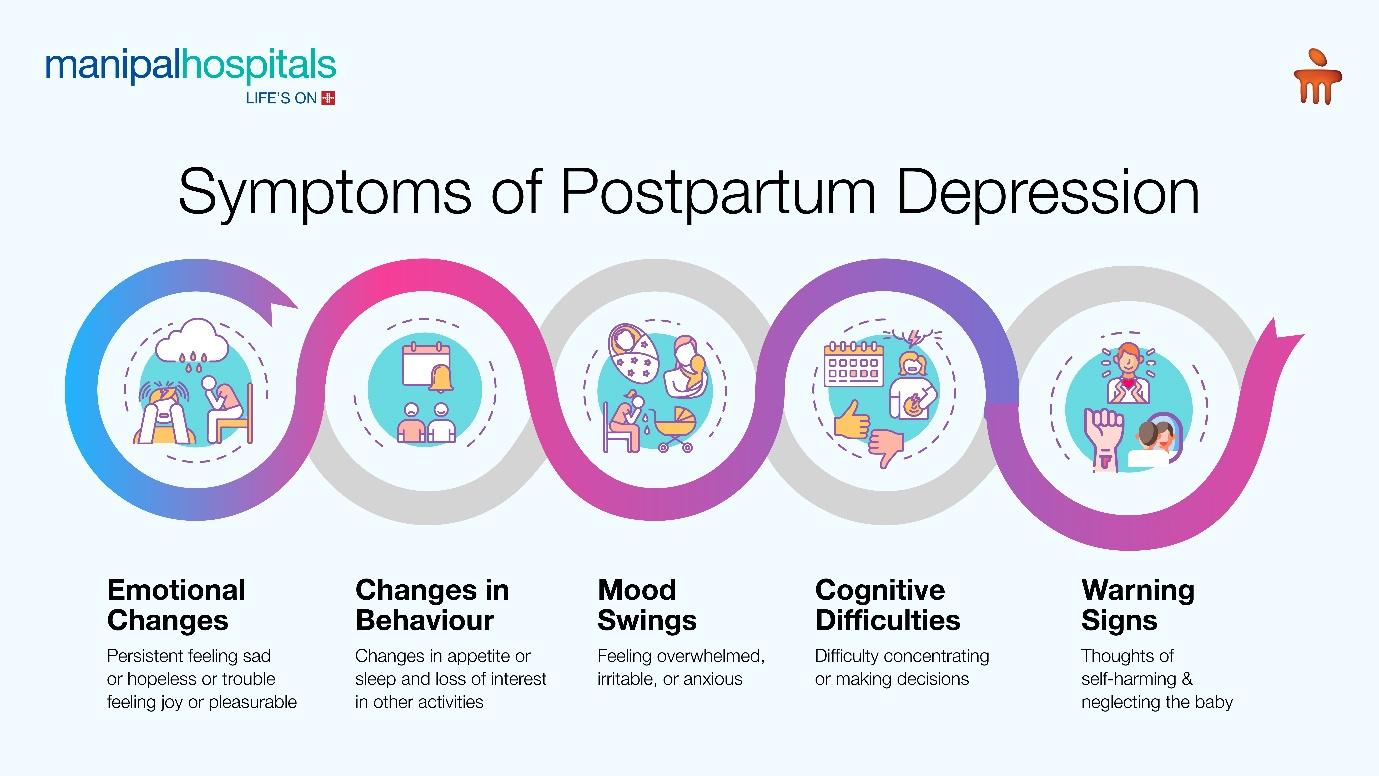
Listen to article
Loading audio...
Hey there, new mama! Congratulations on bringing your little miracle into the world. This is a time of immense joy, excitement, and maybe... a tinge of something else. Don't be surprised if you're feeling a wave of sadness or a dip in your mood. You're not alone! While you're busy showering your baby with love, a condition called postpartum depression (PPD) might be creeping in.
Synopsis
What is Postpartum Depression?
After months of anticipation and waiting, finally it’s time to meet the baby. Yet, instead of pure bliss, sometimes dark clouds hang over mothers. A feeling of deep sadness, a lack of interest in things that she used to love, and maybe even guilt for feeling this way. This mama could have been suffering from postpartum depression or PPD.
PPD is a real and serious mood disorder that affects many new moms. It's more than just the "baby blues" that most experience after childbirth. While those feelings are normal and typically fade within a few weeks, PPD lingers, impacting your daily life for a much longer duration.
What Causes Postpartum?
There isn't a single cause for PPD, but a perfect storm of factors can contribute:
-
Hormonal Changes: Pregnancy and childbirth cause dramatic hormonal shifts. This drop in hormones after delivery can affect your brain chemistry, leading to mood swings and depression.
-
Sleep Deprivation: Newborns are notorious for their erratic sleep schedules. Sleep deprivation is a recipe for anyone's mood to plummet!
-
Lack of Support: Feeling isolated or alone can exacerbate PPD. You might miss your pre-baby life and crave adult interaction.
-
Previous History of Depression: If you've struggled with depression before, you're more at risk for developing PPD.
Recognizing the Signs of Postpartum Depression
Knowing the symptoms of PPD can help you identify it early and seek help. Here are some symptoms to watch out for:
-
Persistent feeling sad or hopeless or trouble feeling joy or pleasurable
-
Changes in appetite or sleep and loss of interest in other activity
-
Feeling overwhelmed, irritable, or anxious

-
Difficulty concentrating or making decisions
-
Thoughts of self-harming and neglecting the baby
Consult a psychiatrist in Mangalore if you are experiencing postpartum depression symptoms.
Conquering PPD: Your Action Plan
Feeling overwhelmed by these symptoms? Don't worry, mama, there's light at the end of the tunnel! Here are some practical steps to help you overcome PPD:
-
Express Yourself: Sometimes, the simplest act can be the most powerful way out. Bottling up your emotions will only make things worse and prone to PPD. Open up and confide in your partner, a trusted friend, family member, or therapist. Finding someone who listens without judgment can be incredibly validating.
-
Seek Emotional Support: You are not meant to go through this alone! Build a strong support system. Lean on your partner, family, and friends. Feeling supported can significantly improve your mood.
-
Nourish Your Body: Healthy eating habits are crucial for both physical and mental well-being. It directly affects how you feel. Incorporate nutritious meals ─rich in fruits, vegetables, whole grains, protein and vitamins. Don’t neglect to stay hydrated.
-
Move Your Body: Exercise might be the last thing on your mind, but it's a powerful mood booster. Even a short walk around the block or gentle yoga can do wonders.
-
"Me Time" Matters: Schedule some time for yourself, even if it's just 15 minutes to take a relaxing bath, read a book, or listen to calming music. Taking care of yourself is not selfish, it's essential!
-
Stress Management: Let's be honest, caring for a newborn is demanding. The constant feedings, diaper changes, and figuring out your little one's needs can be challenging and stressful. Take the process slowly and take the support of your partner.
-
Prioritize Sleep: Sleep can be a luxury with a newborn. But try to get as much sleep as possible, even if it means napping when your baby naps. Getting enough rest can improve your mood and energy levels significantly.
-
Breastfeeding Challenges: Don't suffer in silence. Difficulty breastfeeding can contribute to PPD. You can talk to a lactation consultant and seek assistance if you are experiencing breastfeeding challenges.
-
Connect with Other Moms: Joining a support group for new mothers can provide a sense of community and understanding. Sharing experiences, and facing similar challenges can be comforting.
-
Seek Professional Help: Don’t hesitate to seek help from a healthcare provider, if your symptoms persist or worsen. They can assess your situation and develop a treatment plan, which might include therapy, medication or both.
Consult our psychiatry hospital in Mangalore if you need postpartum depression treatment.
Conclusion
Postpartum depression is a common and treatable condition. It affects not only the new mothers' mood but also their well-being. One can overcome postpartum depression and enjoy the journey of motherhood with the following steps: acknowledging the feelings, seeking support and implementing self-care strategies. There will be good days and bad ones, but gradually, with the right guidance and self-care, you will be able to enjoy this precious journey of motherhood. You can also visit KMC Hospital, Mangalore for any further assistance.
FAQs
FAQ's
Postpartum depression is a serious condition that affects some new mothers after giving birth. Here are some ways to overcome it: Talk it out with somebody you trust, get an adequate amount of rest and sleep, eat healthy food and consider seeking professional help to learn coping strategies.
Postpartum depression can vary in duration for different individuals. It might last for a few weeks to several months. In some cases, it can linger for a year or more if not properly addressed.
Postpartum depression can happen due to a combination of physical, emotional, and lifestyle factors. Some possible reasons include: Hormonal changes after childbirth, lack of sleep and exhaustion from caring for a new-born, previous history of depression or anxiety and the feeling of isolation and support.



















 5 Min Read
5 Min Read















